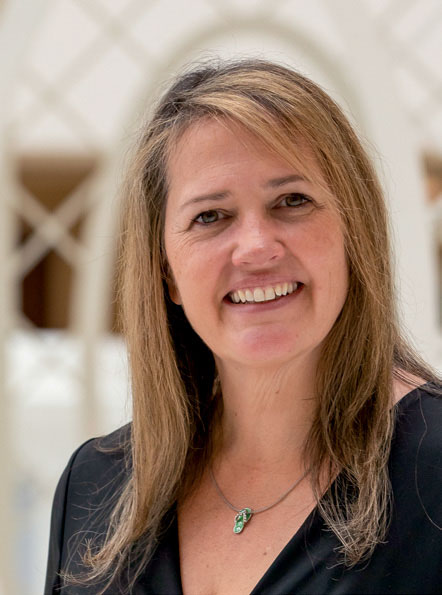The Pulteney StreetSurvey

Intellectual Property
Meghan Donohoe ’92, chief operating officer at the American Intellectual Property Law Association, considers international innovation, economic growth and the ownership of ideas.
BY PAIGE COOKE
“Intellectual property is a huge economic driver,” says Meghan Donohoe ’92. “If you don’t have a way to protect your innovation, there is no longer an incentive to innovate.”
For the past 22 years, Donohoe has served as the chief operating officer for the American Intellectual Property Law Association (AIPLA). AIPLA is a voluntary bar association that supports intellectual property professionals involved in the practice of patent, trademark, copyright, trade secrets and unfair competition law, as well as other legal structures involving intellectual property. The association provides continuing education for its members, who are predominately in the United States, but advocacy efforts stretch around the globe, attempting to strike a balance between international public and private interests.
“The Intellectual Property system is closely tied to the success of the economy in the United States and around the world,” says Donohoe. “It is evolving and changing. With these new challenges, the education and policy work is so important.”
AIPLA’s members focus on both prosecution and enforcement of IP rights. Prosecution entails working with inventors and creators to obtain patents and trademarks and helping them register copyrights. The enforcement side involves litigators who represent inventors and creators in protecting their intellectual property. In addition to education, the association focuses on advocacy and policy issues to support and advance the intellectual property system, supporting and resourcing attorneys in their work, and in turn spurring innovation.
Innovation, Donohoe notes, comes with intellectual property hurdles, some longstanding, some brand new. Curbing counterfeit products is an age-old challenge, while newly developed technology, such as artificial intelligence, presents emerging policy questions. (Can AI be credited as an inventor? Most countries say no.)
AIPLA’s global work brings people in the intellectual property space together. As nearly every country has its own intellectual property laws in place, the advocacy of Donohoe and her colleagues focuses on harmonizing these systems, bring various players together to better understand each other and to stimulate new ideas and collaborations across the globe.
This spring, the AIPLA teamed up with the U.S. Patent and Trademark Office and other organizations to celebrate World Intellectual Property Day, with an emphasis on “amplify[ing] the role women play in the field of intellectual property,” Donohoe says. “To have movement internationally on raising the profile of women in the field is so important. Working to build equity and reduce the gender pay gap are important challenges we are facing. Women can and are succeeding in this space.”
Donohoe notes that between her colleagues and the global impact of their work, “We all see the value of intellectual property and the way it ties to creativity and innovation all over the world. It is very motivating to come together to do the work to continue to strike that balance for both the public and private interests.”
Donohoe holds a bachelor’s in economics and Russian area studies from William Smith and an M.A. in Russian area studies from Georgetown University, with a focus on economics, politics and language. She previously served as director of the Roscoe Pound Institute (now the National Civil Justice Institute).
